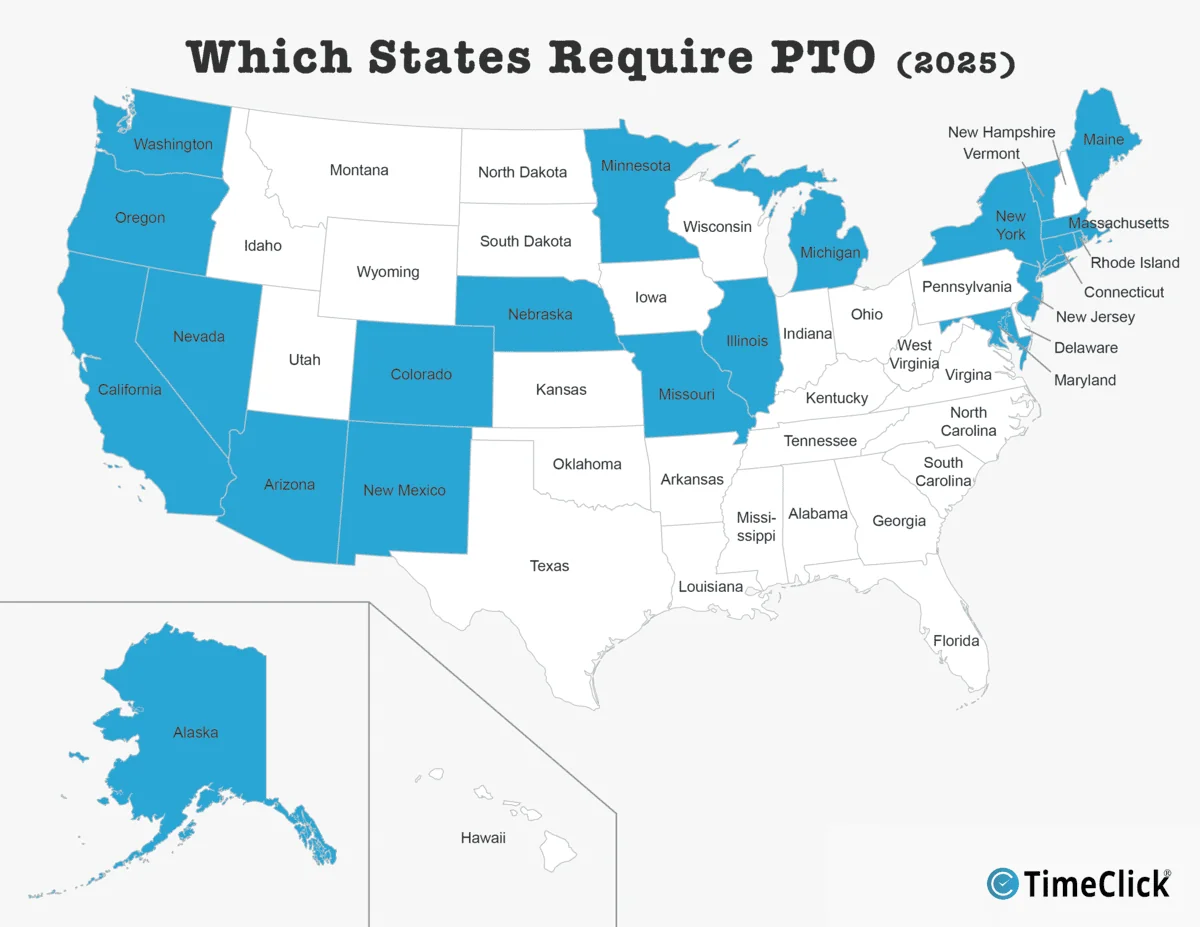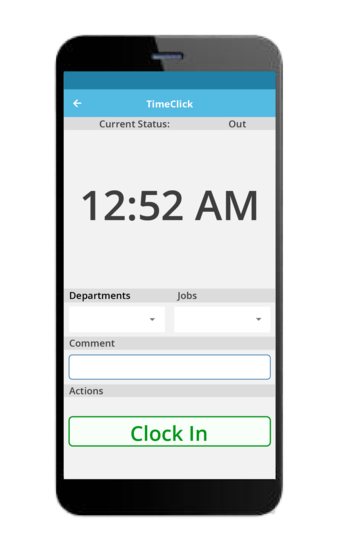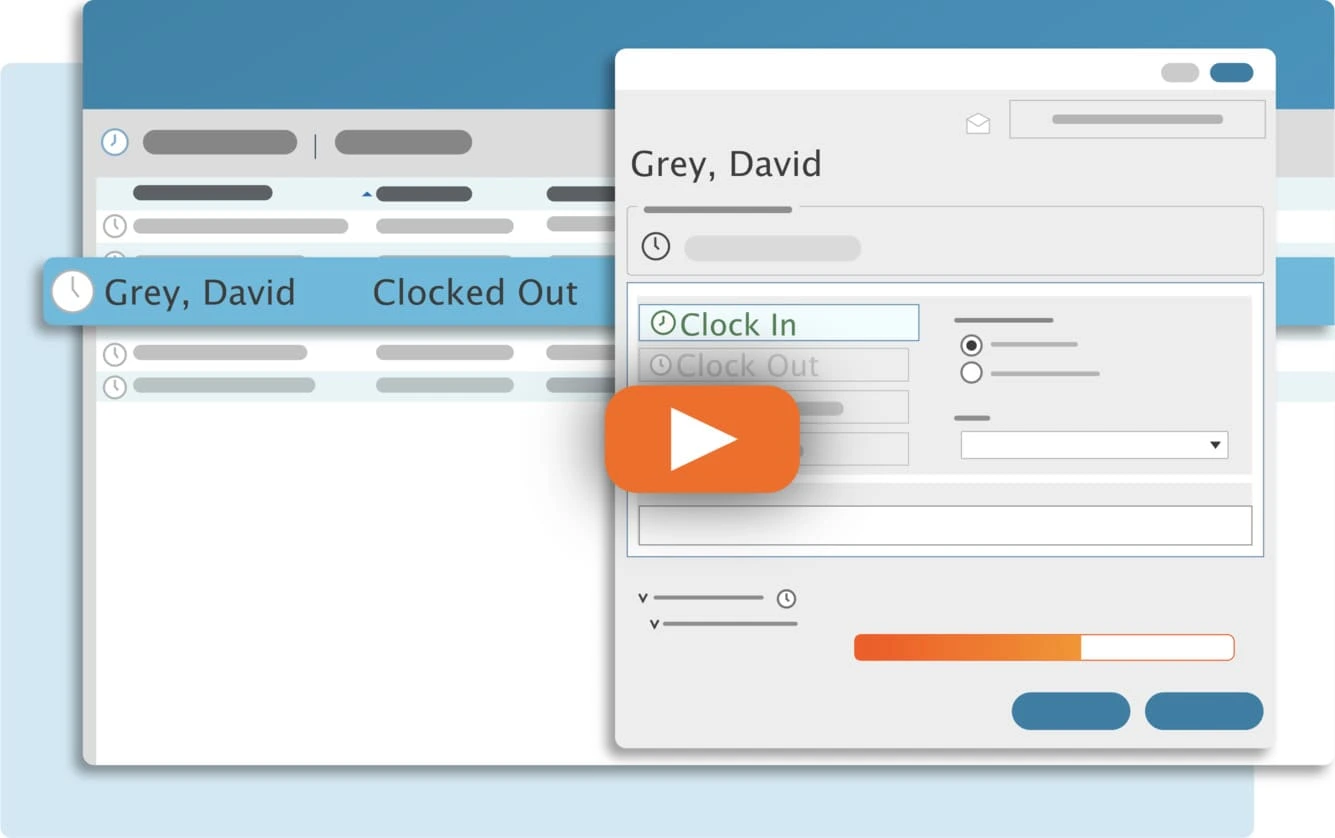Paid time off (PTO) is one of the most valuable benefits employers offer—but it's also one of the most confusing. Why? Because there's no single PTO law in the U.S. Instead, every state sets its own rules, and in many cases, individual cities or counties add extra layers.
If you're an employer, HR manager, or employee trying to make sense of it all, this guide breaks it down. We’ll cover:
- Which states require paid sick leave
- Whether unused PTO must carry over year to year
- When you’re legally required to pay out unused PTO at termination
The rules vary—sometimes drastically—by state. Some places require generous policies. Others leave it entirely up to the employer. And in a few states, getting it wrong can lead to major legal and financial consequences.
Note: In this guide, “PTO” includes both vacation and sick leave, but the rules often differ. Vacation/PTO is usually required to be paid out; sick leave typically isn’t—unless it’s part of a combined policy.
Table of Contents
- Do Federal Laws Require PTO?
- Are Employers Required to Provide Vacation Leave?
- Vacation Leave: What the Law Says
- How It Works with Combined PTO Banks
- PTO Laws by State: What Employers and Employees Need to Know
- California PTO Laws (2025)
- Paid Sick Leave Requirements
- Carryover Rules
- Payout on Termination
- New York PTO Laws (2025)
- Paid Sick Leave Requirements
- Carryover Rules
- PTO Payout on Termination
- Colorado PTO Laws (2025)
- Paid Sick Leave Requirements
- Public Health Emergency Leave (PHEL)
- Carryover Rules
- PTO Payout on Termination
- How Employers Should Handle PTO Legally and Effectively
- 1. Put Your PTO Policy in Writing
- 2. Stay Compliant with State and Local Laws
- 3. Track Accruals and Usage Accurately
- 4. Handle Terminations Correctly
- 5. Be Transparent with Employees
- PTO Best Practices for Employees
- 1. Understand Your PTO Policy
- 2. Track Time Off Accurately
- 3. Plan Ahead When Possible
- 4. Don’t Let PTO Go Unused
- 5. Know the Rules for Sick Time
- 6. Clarify Payout Policies
- Why Accurate PTO Tracking Matters
- Keeps Payroll Accurate
- Prevents Disputes
- Helps with Planning
- Protects Against Legal Issues
- Adds Clarity for Remote & Hybrid Teams
- Frequently Asked Questions About PTO Laws by State
- How TimeClick Simplifies PTO Tracking
- Track Accruals Automatically
- See Balances at a Glance
- Approve or Deny Requests with One Click
- Ensure Compliance Automatically
- Run Payroll-Ready Reports
- Final Thoughts
Do Federal Laws Require PTO?
Short answer: No. There’s no federal law in the United States that requires employers to offer paid time off—whether for vacation, holidays, or sick days.
The Fair Labor Standards Act (FLSA) only sets rules for minimum wage, overtime, and child labor. It doesn’t mandate PTO or require employers to pay out unused time off when someone leaves a company.
Some federal protections do exist—but they only apply to unpaid time off. For example, the Family and Medical Leave Act (FMLA) allows eligible employees to take up to 12 weeks of unpaid, job-protected leave for medical or family reasons. But even that doesn’t require paid time off of any kind.
However, if an employer offers paid time off—whether it's vacation, sick time, or a combined PTO bank—they must follow their own written policy. That’s where state and local laws come in. Many states (and some cities) have rules that cover:
- Minimum amounts of paid sick leave
- Whether unused time off must carry over into the next year (carryover rules)
- Whether employers must pay out unused PTO upon termination
It gets even more specific in certain areas. Cities like San Francisco, New York City, and Seattle have local sick leave laws that go beyond their state requirements. So even if your state doesn’t require PTO, your city might.
To sum it up:
- Federal: No PTO mandate
- State: Some require sick leave, carryover, or payout at termination
- Local: Cities may impose additional requirements beyond state law
TIMECLICK TIP
Even if your state doesn’t require PTO, your company policy is still binding. Be clear about how time off is earned, tracked, and paid out—and make sure employees sign off on it.
Are Employers Required to Provide Vacation Leave?
Now that we’ve covered federal rules, let’s zoom in on one of the most asked-about benefits: vacation time. Unlike sick leave, which some states require, no state in the U.S. mandates paid vacation leave.
That said, once a company offers vacation—even voluntarily—it becomes legally binding. And that’s where state-level rules kick in.
Vacation Leave: What the Law Says
- Voluntary but enforceable: Employers are not required to offer paid vacation, but if they do, they must honor their written policy.
- Vacation = wages in some states: States like California and Colorado treat vacation like earned wages. That means once accrued, it can’t be taken away—even if your policy says otherwise.
- Payout rules vary: Many states require employers to pay out unused vacation when an employee quits, gets laid off, or is fired—especially if it’s considered earned.
- “Use-it-or-lose-it” isn’t always allowed: Some states (like California) ban policies that cause employees to forfeit earned vacation. Employers may cap accrual but can’t wipe out balances arbitrarily.
How It Works with Combined PTO Banks
If you offer a single PTO policy that blends vacation and sick leave, state rules treating vacation as wages typically apply to the entire balance. Unless your policy clearly excludes sick leave from payout, it all may be owed at termination.
TIMECLICK TIP
Want to avoid compliance headaches? Make sure your policy separates vacation from sick leave, or clearly defines what gets paid out. TimeClick tracks each type of PTO independently—so there's no guesswork when someone leaves.
Bottom line: You don’t have to offer vacation—but if you do, state law may limit how you manage it. Get your policy in writing, stick to it, and keep it compliant.
PTO Laws by State: What Employers and Employees Need to Know
Now that we’ve covered how federal law treats PTO—and clarified that vacation time isn’t legally required—let’s shift to what states do mandate. While federal rules are minimal, many states have their own laws around sick leave, carryover, and whether unused time must be paid out when someone leaves.
The image and table below provide a current snapshot of PTO-related laws across all 50 states. They show whether paid sick leave is required, whether unused time must carry over to the next year, and whether employers must pay out unused time at termination.

| State | Paid Sick Leave Required | Carryover Required | Payout on Termination |
|---|---|---|---|
| Alabama | No | No | No |
| Alaska | Yes (from July 1, 2025) | Yes | No (unless policy says so) |
| Arizona | Yes | Yes | No (unless policy says so) |
| Arkansas | No | No | No (unless policy says so) |
| California | Yes | Yes | Yes for vacation/combined PTO (unless sick leave excluded); No for standalone sick leave |
| Colorado | Yes | Yes | Yes for vacation/combined PTO (unless sick leave excluded); No for standalone sick leave |
| Connecticut | Yes (25+ employees, from Jan 1, 2025) | Yes | No (unless policy says so) |
| Delaware | No | No | No |
| Florida | No | No | No (unless policy says so) |
| Georgia | No | No | No |
| Hawaii | No | No | No |
| Idaho | No | No | No (unless policy says so) |
| Illinois | Yes (any reason, 2024 law) | Yes (unless frontloaded) | No (unless policy says so) |
| Indiana | No | No | No |
| Iowa | No | No | No |
| Kansas | No | No | No |
| Kentucky | No | No | No |
| Louisiana | No | No | No |
| Maine | Yes (10+ employees, any reason) | Yes (unless frontloaded) | No (unless policy says so) |
| Maryland | Yes | Yes | No (unless policy says so) |
| Massachusetts | Yes | Yes | No (unless policy says so) |
| Michigan | Yes (all employers, from Feb 2025) | Yes | No (unless policy says so) |
| Minnesota | Yes (from 2024) | Yes | No (unless policy says so) |
| Mississippi | No | No | No |
| Missouri | Yes (from May 1, 2025) | Yes | No for sick leave (Yes if frontloaded) |
| Montana | No | No | No (unless policy says so) |
| Nebraska | Yes (from Oct 1, 2025) | Yes | No for sick leave (Yes if frontloaded) |
| Nevada | Yes (any reason, 50+ employees) | Yes | No (unless policy says so) |
| New Hampshire | No | No | No (unless policy says so) |
| New Jersey | Yes | Yes | No (unless policy says so) |
| New Mexico | Yes | Yes | No (unless policy says so) |
| New York | Yes | Yes | No (unless policy says so) |
| North Carolina | No | No | No (unless policy says so) |
| North Dakota | No | No | No |
| Ohio | No | No | No (unless policy says so) |
| Oklahoma | No | No | No |
| Oregon | Yes | Yes | No (unless policy says so) |
| Pennsylvania | No | No | No (unless policy says so) |
| Rhode Island | Yes | Yes | No (unless policy says so) |
| South Carolina | No | No | No |
| South Dakota | No | No | No |
| Tennessee | No | No | No |
| Texas | No | No | No (unless policy says so) |
| Utah | No | No | No (unless policy says so) |
| Vermont | Yes | Yes | Yes (if accrued and earned) |
| Virginia | No | No | No |
| Washington | Yes | Yes | No (unless policy says so) |
| West Virginia | No | No | No |
| Wisconsin | No | No | No (unless policy says so) |
| Wyoming | No | No | No |
Note: Laws are current as of April 2025, but always double-check with your state’s labor department for the latest updates.
Now that you’ve seen how PTO laws compare across states, let’s take a closer look at a few key states with detailed or unique requirements. These spotlights cover exactly how PTO, sick leave, carryover, and payout rules work in each location—so you know what to expect whether you're managing a team or tracking your own time off.
California PTO Laws (2025)
California has some of the most comprehensive paid leave laws in the country. If you have employees in California, your PTO and sick leave policies must meet the state’s minimum requirements—and in some cities, local laws go even further.

Paid Sick Leave Requirements
Under the Healthy Workplaces, Healthy Families Act, most California employees are entitled to paid sick leave. As of 2025, the law requires:
- At least 5 days (40 hours) of paid sick leave per year
- Accrual at a rate of at least 1 hour per 30 hours worked
- Eligibility after 30 days of work and use after 90 days
Some cities—like San Francisco, Los Angeles, and Oakland—have their own paid sick leave rules that offer even more generous benefits. Always check local ordinances if your company operates in these areas.
Carryover Rules
Unused sick leave must carry over to the next year, but employers can cap total accrual at 80 hours or 10 days. Employers may also limit usage to 40 hours per year, unless local laws are more generous.
Payout on Termination
In California, the law distinguishes between sick leave and other types of paid time off:
- Vacation time or combined PTO (a single bank for vacation and sick leave) is legally considered earned wages. It must be paid out upon termination—whether the employee is fired, laid off, or resigns.
- Standalone sick leave is not required to be paid out at termination. In a combined PTO policy (e.g., vacation and sick leave together), the entire unused balance must be paid out as wages unless the policy explicitly excludes sick leave from payout.
TIMECLICK TIP
Failing to pay out unused vacation or combined PTO in California can result in waiting time penalties—up to 30 days’ wages. Use TimeClick to clearly separate sick leave from vacation, track balances in real time, and avoid costly compliance mistakes.
New York PTO Laws (2025)

New York state requires most employers to provide paid sick leave, with the amount depending on company size and net income. There’s no statewide requirement to offer vacation time—but if you do, your policy must comply with state rules on carryover and final payout.
Paid Sick Leave Requirements
Under the New York Paid Sick Leave (PSL) law:
- Employees earn 1 hour of sick leave for every 30 hours worked
- Employers must provide:
- 0–4 employees and <$1 million net income: up to 40 hours of unpaid sick leave
- 0–4 employees and ≥$1 million net income: up to 40 hours of paid sick leave
- 5–99 employees: at least 40 hours of paid sick leave
- 100+ employees: at least 56 hours of paid sick leave
Carryover Rules
Unused sick leave must carry over to the next calendar year. However, employers may cap annual usage at 40 or 56 hours, depending on the business’s size.
PTO Payout on Termination
New York does not require employers to pay out unused vacation or PTO at termination—unless your written policy or employee contract says otherwise. That’s why clearly documenting your PTO policy is essential.
TIMECLICK TIP
In New York, your PTO policy is only enforceable if it’s in writing and shared with employees. Make sure it’s acknowledged in onboarding and kept up to date to avoid disputes.
Colorado PTO Laws (2025)

Colorado has some of the most robust paid leave laws in the U.S. All employers must provide paid sick leave—and during a public health emergency, additional leave may be required. The rules are detailed and apply across industries, so it’s important to stay compliant.
Paid Sick Leave Requirements
Under the Colorado Healthy Families and Workplaces Act (HFWA):
- Employees earn 1 hour of paid sick leave for every 30 hours worked
- All employers, regardless of size, must provide up to 48 hours of paid sick leave per year
- Employees can begin using accrued leave as soon as it’s earned
Public Health Emergency Leave (PHEL)
During a declared public health emergency, Colorado requires an additional bank of leave—up to 80 hours. This is on top of the standard 48 hours and must be made available immediately.
Carryover Rules
Employees may carry over up to 48 hours of unused sick leave into the next year. However, employers are not required to allow use of more than 48 hours in a single year.
PTO Payout on Termination
In Colorado, earned vacation time or combined PTO is legally considered wages. That means:
- Accrued and unused vacation or PTO must be paid out when an employee leaves
- “Use it or lose it” policies are not allowed for vacation or PTO
- Paid sick leave under HFWA is not required to be paid out at termination if standalone. In a combined PTO policy, the entire unused balance must be paid out as wages unless the policy explicitly excludes sick leave.
TIMECLICK TIP
In Colorado, vacation time or combined PTO must be paid out when an employee leaves—even if your policy says otherwise. In a combined PTO policy, sick leave is included in the payout unless the policy explicitly excludes it. Use TimeClick to track balances clearly and ensure compliance.
Simplify Time Tracking with TimeClick!
Download our free trial—simple, secure, offline tracking, no fluff.

How Employers Should Handle PTO Legally and Effectively
Whether your state mandates PTO or leaves it up to employer policy, how you administer time off can make or break employee trust—and expose your business to risk. Here’s how to do it right.
1. Put Your PTO Policy in Writing
Clarity is everything. A well-documented PTO policy helps prevent misunderstandings and protects both you and your team. Your policy should clearly state:
- Who is eligible (full-time, part-time, tenure requirements)
- How PTO is accrued (e.g., per pay period or annually)
- How much notice is required to take time off
- Whether unused PTO rolls over to the next year
- Whether PTO is paid out upon termination
2. Stay Compliant with State and Local Laws
If you operate in multiple states or cities, your PTO policy must align with all applicable local laws. For example, cities like San Francisco and New York have more generous sick leave rules than their respective states.
TIMECLICK TIP
When in doubt, follow the most employee-friendly rule that applies. That way, you stay compliant and competitive.
3. Track Accruals and Usage Accurately
Manual PTO tracking leads to errors, disputes, and compliance issues. Use time tracking software like TimeClick to automatically:
- Accrue PTO by hours worked or tenure
- Deduct PTO accurately when used
- Report balances and trends to both management and employees
4. Handle Terminations Correctly
One of the most common PTO compliance issues arises when an employee leaves. In states where PTO is considered earned wages, failing to pay it out can trigger wage claims or lawsuits. Always:
- Pay out accrued PTO if your policy or state law requires it
- Include the payout in the employee’s final paycheck
- Keep documentation of the PTO balance and payment
Note: Most states don’t require payout of sick leave unless it’s part of a combined PTO policy.
5. Be Transparent with Employees
Make it easy for employees to see how much PTO they’ve accrued and used. Regular visibility prevents confusion and encourages thoughtful time-off planning.
TIMECLICK TIP
Send out a PTO balance report at the start of each quarter. It’s a small step that builds big trust.
Bottom line: Managing PTO the right way reduces compliance risk, improves employee satisfaction, and saves time during payroll. With clear policies and smart tracking tools, everyone wins.
PTO Best Practices for Employees

If you receive paid time off, how you use it can make a big difference in your financial health, well-being, and work-life balance. Whether you're new to the workforce or a seasoned professional, these best practices help you get the most out of your PTO.
1. Understand Your PTO Policy
Don’t assume anything—read your company’s handbook or ask HR. Know how much PTO you get, how it’s earned, when it resets, and whether it carries over or gets paid out if you leave.
TIMECLICK TIP
Ask for your current PTO balance at least once per quarter. It helps you plan smarter—and avoids surprises at the end of the year.
2. Track Time Off Accurately
Keep a personal record of when you take time off and how much. Even if your company uses tracking software, having your own notes can help resolve discrepancies and plan ahead.
3. Plan Ahead When Possible
Give your manager or team enough notice before taking PTO, especially for longer vacations. Planning in advance helps your team stay covered and reduces last-minute stress on everyone.
4. Don’t Let PTO Go Unused
If your company has a “use-it-or-lose-it” policy or caps carryover, take advantage of your time while you have it. Time off helps prevent burnout and boost productivity when you return.
TIMECLICK TIP
Look ahead to major holidays or slow periods to combine PTO for a longer break without using as many days.
5. Know the Rules for Sick Time
If your state requires paid sick leave, know what qualifies. Most laws allow use for physical illness, mental health, medical appointments, and caring for family. Check if documentation is needed for extended absences.
6. Clarify Payout Policies
If you’re thinking of leaving a job, check your employer’s policy on unused PTO. In some states, it must be paid out—while in others, it’s optional unless promised in writing.
Bottom line: PTO is part of your total compensation. Understanding your rights and using your time wisely ensures you’re taking full advantage of what you’ve earned—without leaving benefits on the table.
Why Accurate PTO Tracking Matters
Paid time off is valuable—but only if it's tracked and managed properly. Whether you're an employee trying to maximize your benefits or an employer aiming for clean payroll and compliance, consistent PTO tracking protects your time and your bottom line.
Keeps Payroll Accurate
Misreporting PTO can lead to underpayments, overpayments, or payroll errors that take hours to fix. Accurate tracking ensures employees are paid correctly—and companies stay compliant with labor laws.
Prevents Disputes
When time off isn’t tracked clearly, misunderstandings happen. Employees might think they have more PTO left than they do. Employers might deny time off by mistake. A clear, automated system prevents these issues from turning into bigger problems.
TIMECLICK TIP
Use a system that lets employees see their own PTO balance in real time. Transparency builds trust and reduces back-and-forth with HR.
Helps with Planning
When PTO is tracked consistently, managers can spot patterns—like heavy vacation months or overlapping time off—and plan ahead. It also helps teams avoid being short-staffed during busy periods.
Protects Against Legal Issues
Some states require employers to track paid sick leave and provide documentation upon request. Failing to do so can lead to penalties, audits, or lawsuits. A reliable PTO system helps meet legal requirements without scrambling for data later.
Adds Clarity for Remote & Hybrid Teams
When employees aren’t clocking in from an office, it’s even more important to have a clear record of time off. A digital tracking tool ensures everyone’s on the same page—no matter where they work.
Bottom line: Accurate PTO tracking isn’t just nice to have—it’s essential. It reduces errors, protects your business, and helps employees use their benefits with confidence.
Frequently Asked Questions About PTO Laws by State
Do all states require employers to offer paid sick leave?
No. As of 2025, only around 18 states—including California, New York, Colorado, Illinois, and Michigan—require paid sick leave. In many others, it's up to employers or local governments to decide. Cities like San Francisco and Seattle have their own sick leave laws that go beyond state requirements.
Which states require PTO payouts when someone quits?
States like California and Colorado treat vacation or PTO as earned wages, which means it must be paid out at termination. Sick leave is generally not required to be paid out unless it’s part of a combined PTO policy. Vermont is an exception—it requires payout of unused sick leave if it’s been accrued and earned. In states like Texas or Florida, it depends on your company’s written policy.
Can employers have “use-it-or-lose-it” PTO policies?
It depends on the state and type of leave. In California, vacation/PTO can't be forfeited—unused time must carry over or be paid out. Sick leave, on the other hand, must carry over but can be capped (usually at 80 hours) and isn’t paid out unless part of a combined PTO bank, where it’s included in payout unless excluded by policy. Other states may allow use-it-or-lose-it policies for either type, as long as the rules are clearly stated in the employee handbook.
How much paid sick leave is required by law?
It varies by state. Most sick leave laws require between 24 and 56 hours per year, depending on employer size. For example, New York requires 40–56 hours, while Arizona mandates 24–40 hours. Cities like San Francisco and Los Angeles often require more—for example, San Francisco allows accrual up to 72 hours.
Are part-time employees entitled to PTO?
In many states with paid sick leave laws, yes. States like California, Washington, and Michigan extend coverage to part-time, temporary, and seasonal workers. Vacation time, however, is typically defined by your employer’s policy and may not apply to part-time staff unless specified.
What happens to unused PTO at the end of the year?
It depends on state law and your company's policy. In California, unused vacation/PTO must carry over without caps; employers may optionally pay it out to reduce accrued balances. Sick leave must carry over up to an 80-hour accrual cap. In other states, employers may cap carryover or implement use-it-or-lose-it policies—especially for sick leave—as long as it complies with local law and is clearly written.
Do I need to pay out unused vacation if the employee is fired?
In states like California and Colorado, vacation or combined PTO must be paid out regardless of how employment ends. Standalone sick leave is not required to be paid out unless part of a combined policy (and included per policy terms). In states that don’t require it, you only have to pay if your company’s written policy or contract promises it.
Can cities have different PTO laws than the state?
Yes. Cities like San Francisco, San Diego, Seattle, and New York City often have their own paid sick leave laws that add extra requirements. If your business operates in multiple cities or states, you’ll need to follow whichever rule is most generous to the employee.
TIMECLICK TIP
PTO compliance starts with documentation. Even if the law doesn’t require something, your policy might. Always put your PTO rules in writing—and make sure employees acknowledge them.
How TimeClick Simplifies PTO Tracking
If you’re still using spreadsheets, manual logs, or relying on employees to track their own time off, it’s easy for things to fall through the cracks. TimeClick takes the guesswork out of PTO by automating the entire process—saving time and reducing errors.
Track Accruals Automatically
TimeClick lets you set custom accrual rules by employee, role, or tenure. Whether you offer PTO monthly, annually, or per hour worked, the system tracks it automatically—no manual math required.
See Balances at a Glance
Employees and managers can view PTO balances in real time. No more asking HR or digging through files to see how much time is left. Everyone stays informed and up to date.
Approve or Deny Requests with One Click
TimeClick makes it simple for employees to request time off—and just as simple for managers to approve it. You can view who’s already scheduled off and avoid conflicts before they happen.
Ensure Compliance Automatically
With detailed records and clean audit trails, TimeClick helps your business stay compliant with state PTO laws. If you’re ever asked to provide documentation, it’s all there—organized and exportable.
Run Payroll-Ready Reports
When PTO is already tracked in your timekeeping system, generating accurate payroll reports is easy. TimeClick integrates with leading payroll tools and eliminates the risk of double entry or missed time off.
TIMECLICK TIP
Set up PTO rules once and let TimeClick handle the rest. You’ll avoid manual tracking, reduce admin time, and improve accuracy across the board.
→ Try TimeClick free for 14 days and see how easy PTO tracking can be.
Final Thoughts
PTO laws vary widely depending on where you live and work—and if you're a business owner or HR manager, staying on top of those differences is critical. From carryover rules to termination payouts, even a small oversight can lead to compliance issues or employee dissatisfaction.
Understanding the PTO laws in your state ensures you're protecting your business, supporting your team, and avoiding costly legal trouble. And if you're an employee, knowing your rights helps you make informed decisions about time off, job offers, and your overall work-life balance.
Whether your state requires paid sick leave or not, whether your policy allows rollover or not, one thing is clear: accurate tracking matters. TimeClick makes it simple to manage every aspect of PTO—from accruals to approvals to audit-ready reporting.
Start your free 14-day trial with TimeClick and make PTO one less thing to worry about.
Start your FREE TimeClick Trial Today.

